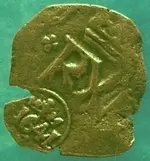- #1
Thread Owner
I used to polish copper maravedis cobs for people who wanted them for jewelry or who just liked shiny old coins.
I no longer do this because some would take these polished cobs to a "local coin shop" and usually they were declared "fake."
I knew they were genuine because I got them corroded from the fields in Spain. And too they were all checked by an expert Spanish authority prior to my selling them. Yet most "coin dealers" said "fake."
There are really few out there who know Spanish coins/cobs. This is especially true of the copper 16th & 17th century cobs.
So, when you buy a cob--be it silver reale or silvered copper cob or solid copper cob--take it to someone who knows what he's (she's) talking about. There are way too many self-proclaimed part-time "experts" out there today.
Here's one of my favorite maravedis cobs. By-the-way, your average "coin shop" would immediately pronounce this "fake." Why? well--it's not all dirty--that's why!
I no longer do this because some would take these polished cobs to a "local coin shop" and usually they were declared "fake."
I knew they were genuine because I got them corroded from the fields in Spain. And too they were all checked by an expert Spanish authority prior to my selling them. Yet most "coin dealers" said "fake."
There are really few out there who know Spanish coins/cobs. This is especially true of the copper 16th & 17th century cobs.
So, when you buy a cob--be it silver reale or silvered copper cob or solid copper cob--take it to someone who knows what he's (she's) talking about. There are way too many self-proclaimed part-time "experts" out there today.
Here's one of my favorite maravedis cobs. By-the-way, your average "coin shop" would immediately pronounce this "fake." Why? well--it's not all dirty--that's why!





